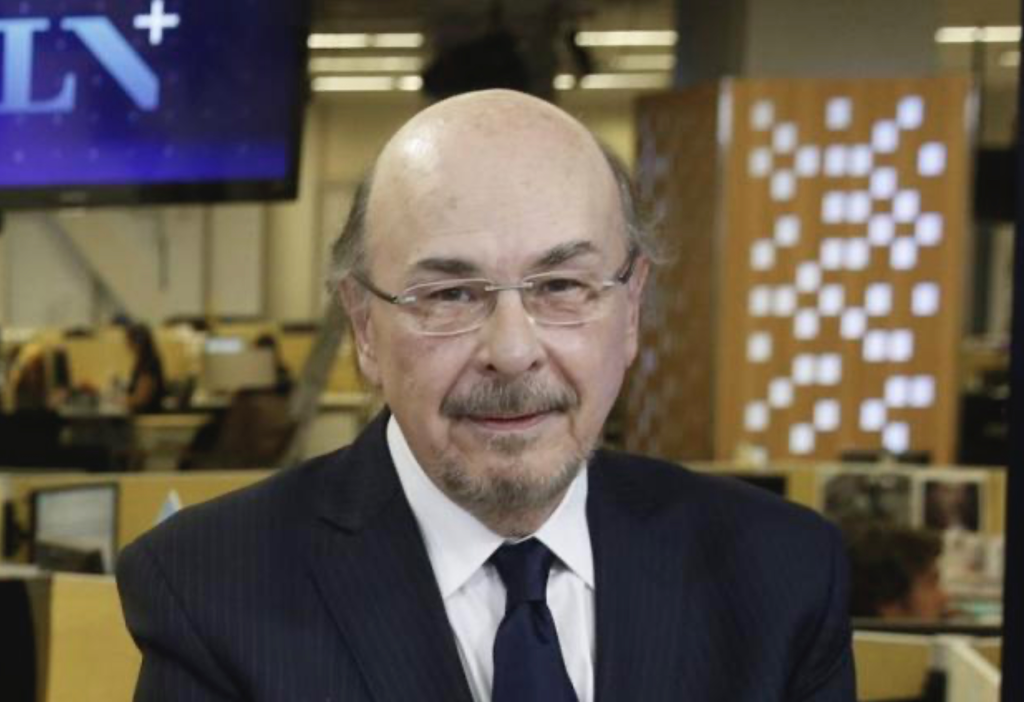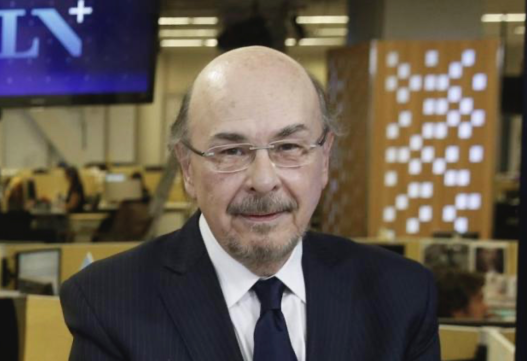JOAQUÍN MORALES SOLÁ
A FED-UP COUNTRY CHOSE SOMETHING ELSE

He was defeated by his own trickery. Sergio Massa was buried yesterday (November 19, 2023) by an avalanche of votes in favor of Javier Milei, the candidate he helped to grow in order to divide the opposition and ruin the life of Juntos por el Cambio. The Argentine society must have glimpsed this trick, because yesterday it decided to leave the known territory, certainly devastated, to enter a new political time, full of innovations. These are those moments in which a clear social majority prefers to leave where it is, by any door, because it senses that any alternative will be better than the one it has had to suffer so far.
Argentina was also reconciled yesterday with political logic, which it had defied in this year’s elections like an alienated person who does not know the law of gravity. Not because it gave the triumph to Milei, but -and above all-, because it did not reward a Minister of Economy of a deranged economy. During Massa’s administration, inflation doubled, the price of the parallel dollar quadrupled and poverty fell on a significant number of Argentines, between three and four million people more, depending on how it is measured. Could the head of such a destroyed economy win the presidency of the Nation? If that had happened, we should now be asking ourselves deeper questions, not only about politics, but also about the conditions of a very particular society. But that did not happen.
It is true that no other candidate for president (not even the two Kirchners and their proverbial political nerve) had so brazenly used the resources of the State for their own benefit as Massa did. The Minister’s last weeks were a permanent oscillation between the supposed consensual and open statesman, as he wanted to be recognized, and the candidate who spent more than 2 points of the GDP -a monumental figure- for his personal interests, which is what he really was. He did not even deprive himself of closing his electoral campaign in a public school which is, moreover, under the jurisdiction of the University of Buenos Aires, such as the Carlos Pellegrini High School. Universities are by definition a diverse mosaic of ideas and, more than anything else, alien to the interference of political rulers.
Nothing stopped Masa. He went through the whole electoral campaign without stopping for a moment in the audacity and provocation of his actions as candidate and Minister of Economy. That took him to the inexplicable summit where he dwelled until last night. Enough. Milei beat him with a defeat of more than eleven percentage points, which is not usual in ballots, in which one wins or loses, usually by two or three points. Massa’s provocations did not even end when he realized that he had lost badly. He said when he accepted the defeat, before any official data was known, that from Monday the economy will depend on the president elect; that is to say, on Milei. False. The economy will continue to depend, until December 10, on the current Minister of Economy; that is, on Massa. Milei will only be able to make verbal contributions to the serenity of things, but he will not have any factual resources to apply his policies, good or bad, until he takes office.
Such was the magnitude of the defeat that Massa will not even be able to make use of his plan B, which consisted in leading the renewal of Peronism. A Peronist who lost in such a way to an amateur politician will hardly be able to consummate the political crime of Cristina Kirchner, her son Máximo and La Cámpora. Nevertheless, Massa’s close associates maintained last night, between dumbfounded and defiant, that their leader was planning to place himself at the head of the Peronist renovation and that for that he has the approval of the governors of his party. Does he count or did he count? Massa had to describe to the governors a probable result very close to Milei’s, even with Milei’s victory, and that is why he complicated them in their conspiracy against the Kirchners. But last night was an unmitigated electoral disaster; a similar result was only experienced in 2011 with the reelection of Cristina Kirchner, but for her benefit, not against her. One thing is that Massa has been weakened to face Cristina; another thing is that she has regained strength. This is not true. She is weaker than ever, exposed to the ambition of an efficient Peronist willing to unseat her from the party leadership. She has just done what she has always done: she intends to take refuge behind the cassock of Pope Francis. Once again it became clear that Argentine politicians do not think about the pontiff, but about their own supposed convenience.
If Mrs. Kirchner cannot run for election because of the homeric bad image that accompanies her, why does she subject the Pope to this unnecessary contagion? Because it is convenient for her. There is no other explanation. Since 2015, Cristina tried several times to meet with the head of the Catholic Church, especially when the judicial investigations against her were intensifying. The Pope always avoided that meeting, but now he is asking her who is still the vice-president of her country.
Overacting in theater, in life or in politics ends badly. A public opinion analyst pointed out last Friday that Massa’s fear campaign had passed all existing barriers of prudence. Fear of being left without health care (health care is falling now); fear of not being able to get vaccinated (just those who dodged the most effective vaccines against Covid); fear of losing subsidies for electricity and gas consumption (Massa considerably increased those rates), and fear of being left without transportation. All of these fears were insistently installed and hammered before Argentines who are already surfing a tragedy, and who were not willing to be more afraid of the future than of the hard, visible and tangible reality they are living. Massa had already gone too far when in the last debate, a week before the ballot, he played with Milei as an old politician, a master of all artifices, in front of an inexperienced who could hardly defend himself. Political professionals said that Massa had won the debate, but the common people showed solidarity with the victim, with that Milei cornered by a professional of tripping.
Milei is a question mark without answers. His only offer was that he means change, and his letter of introduction says that he is a man with no past in a politics that was clamoring for something new. He did not need anything else before a society that got tired (fed up, rather) of searching among the alternatives of classical politics. Last night’s end sketches the country of the angry, tired and disappointed society that the most serious public opinion analysts had been describing. The three most prestigious pollsters in the country (in strict alphabetical order: Aresco, led by Federico Aurelio; Isonomía, led by Juan Germano and Pablo Knopoff, and Poliarquía, led by Eduardo Fidanza and Alejandro Catterberg) had anticipated on Friday a victory of Milei by a difference of around seven or eight percent with respect to Massa. The official disaster was worse: Milei surpassed Massa by 11.39 percentage points.
We know very little about Milei. He knows about economics (especially macroeconomics), but it is evident that he lacks political experience, a lack that was precisely what society valued. From now on, he may lean towards a policy of dialogue and institutionalism as proposed by his main political advisor, Guillermo Francos, perhaps his Minister of the Interior, and his eventual Chancellor, the renowned economist Diana Mondino, or he may give free rein to his apparently volcanic character. But, is this character true or was it part of his best electoral strategy? Could he have been for fifteen years head of the team of economists of one of the richest men in the country, Eduardo Eurnekian, who is easily carried away by the moods of the moment? Difficult, if not impossible. There is a reason why he chose Francos and Mondino (just to give two examples) and not a curmudgeon as he appeared to be. In any case, he will also be the most parliamentary fragile president since the restoration of democracy. Never since 1983 has there been a president with only 39 deputies and eight senators, less than 20 percent of the Chamber of Deputies and little more than 10 percent of the Senate. Too little.
Negotiations and agreements will be mandatory and permanent. In addition, its most controversial proposals require congressional approval. Others, such as the annihilation of the Central Bank or dollarization, will require a reform of the Constitution, which stipulates that there will be a “state bank” in charge of “issuing currency and fixing its value”. It is clear that both the Central Bank and the national currency are in the Constitution. A reform of the Constitution needs two thirds of each house of Congress to provide for the need to open the law of laws. Only two leaders with the political and parliamentary weight of Raúl Alfonsín and Carlos Menem could in modern times change some things in the Constitution, not its preamble or its declaration of rights and guarantees.
Mauricio Macri and Patricia Bullrich could look themselves in the mirror last night and say that they had perceived better than others the mood of society. In fact, according to almost unanimity of pollsters, Milei started an unstoppable upward curve in voting intentions when he received Macri’s support; important social sectors deduced that the former president could solve the inexperience of the libertarian candidate. Perhaps Macri knew it or sensed it because in his last public appearances he stressed that his support to Milei was conditioned to the rationality of Milei’s policies and proposals. But Milei himself knew it, and last night he especially thanked Macri and Bullrich for their support when the dimension of his victory was already known. The libertarian candidate was able to drag towards him all the votes that the former presidential candidate harvested in the first round, and also some votes that went to Juan Schiaretti. Milei and Macri talk more than what is known; the libertarian leader calls the former head of state “presi” in private.
It must be acknowledged, however, that Juntos por el Cambio will not be as it was. Just last night, Elisa Carrió announced her departure from that coalition when she considered it “broken” and announced that her party “regained its full autonomy”. In simple words: she and the Civic Coalition are no longer in Juntos por el Cambio.
Radicalism expressed itself in very different ways. The governor-elect of Mendoza, Alfredo Cornejo, a candidate to replace Gerardo Morales in December in the presidency of the radicalism, greeted Milei’s triumph with cordial paragraphs. Another candidate to lead the radicalism, the governor of Corrientes, Gustavo Valdés, informed earlier that Milei had won in his province. Gerardo Morales, Martín Lousteau and Emiliano Yacobitti, who express the closest fringe to Massa among the radicals, kept prudent silence. It is not even possible to assure that Pro, the party founded by Macri, will remain as it was. Macri also had to warn that the coalition he helped to build would no longer be the same. Last weekend, he dedicated a harsh tweet to Gerardo Morales, who answered him in the worst way.
Peronism and Juntos por el Cambio will be reconfigured in such a way that, surely, soon nobody will recognize them. Peronism will shake off Kirchnerism and it is likely that, as it has always happened with that party, the new leadership will also come with proposals for changes in the direction in which the world is moving. It would be good news if local politics would start to debate according to the paradigms of the great nations; if it would definitively leave aside the sad and chaotic Argentine exceptionality.
This article was originally published in the newspaper La Nación, Argentina, with whose authorization it is reproduced here.



